Answer these simple questions and we will find you the BEST prices
Which type of solar quotes do you need?
It only takes 30 seconds
100% free with no obligation

Get up to 4 quotes from our selected suppliers by filling in only 1 form

Save money by comparing quotes and choosing the most competitive offer

Our service is 100% free and with no obligation
- Market-Inspector.co.uk
- Vehicle Tracking
- Business vehicle tracking
Business Vehicle Tracking: Benefits, Laws, Solutions

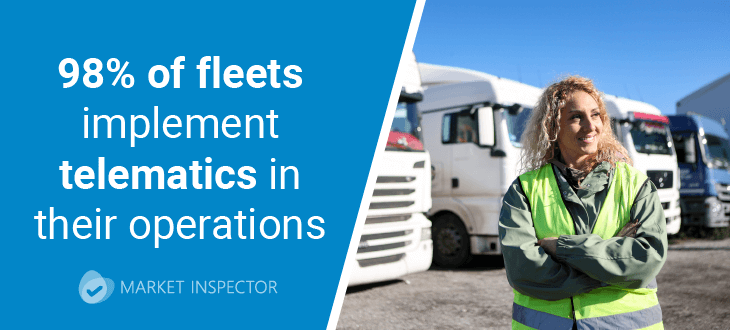
- 98% of fleets use telematics across all or parts of their operations.
- By using vehicle tracking, companies boost their operational efficiency and contribute substantially toward achieving the broader environmental objectives set by global communities.
- Investing in a robust fleet management solution is vital for businesses looking to improve customer service in an era where efficiency and reliability are paramount.
Vehicle tracking systems have transformed fleet management, significantly enhancing operational efficiency, cost management, security, and customer satisfaction, as highlighted in a survey titled The Telematics Survey 2024 by Teletrac Navman.
These systems are pivotal for monitoring vehicle locations and driver behaviour, driving substantial improvements in service delivery and business operations dynamics. By integrating advanced telematics, companies optimise their operations and align with evolving regulatory and environmental standards.
The adoption of telematics in fleet operations is widely recognised for improving efficiency and safety through real-time tracking and smart data analysis. Currently, 98% of fleets use telematics across all or parts of their operations, reflecting this technology's broad acceptance and integration.
- Describe your needs
- Get free quotes
- Choose the best offer
It only takes 30 seconds

Why choose commercial vehicle tracking?
Commercial vehicle tracking systems are invaluable for businesses looking to optimise their fleet operations, improve service quality, and enhance overall profitability.
By leveraging these systems' data, companies can make informed decisions that propel them towards achieving their business goals more effectively. Let’s take a look at the benefits in more detail below.
Improved fleet management
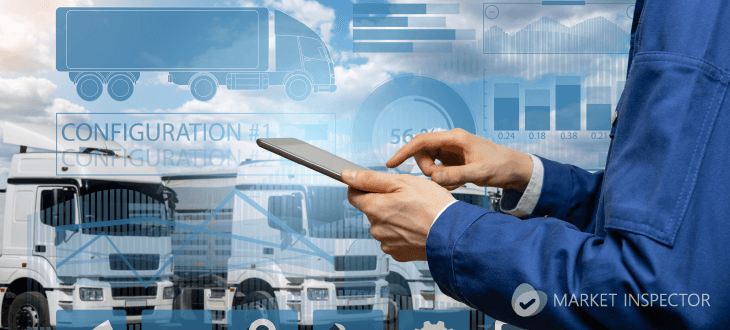
The Telematics Survey 2024 notes that real-time GPS tracking ensures continuous visibility of fleet vehicles, which is crucial for enhancing route management and operational agility.
This capability is indispensable for dynamic routing adjustments and efficient on-ground asset management, leading to reduced response times and increased service reliability. Managers can react instantly to traffic updates and reroute drivers to avoid delays, ensuring timely deliveries.
Vehicle tracking systems provide real-time data and automated reports that help streamline operations. Businesses can monitor vehicles continuously, manage routes efficiently, and reduce idle times. This leads to better fuel management and lower operational costs.
Enhanced productivity
By analysing traffic patterns and vehicle usage data, vehicle tracking systems enable companies to plan more efficient routes. This minimises downtime and maximises the number of deliveries or service calls within the same timeframe, effectively increasing the fleet's productivity and operational capacity.
This is according to Teletrac Navman’s Telematics Survey 2024 report, which highlights that these systems allow for better time management and help enforce driver accountability.
Vehicle tracking systems provide real-time data and automated reports that help streamline operations. Businesses can monitor vehicles continuously, manage routes efficiently, and reduce idle times. This leads to better fuel management and lower operational costs.
Reduced costs
Optimising fuel consumption, decreasing idle times, and enhancing route efficiency play a pivotal role in reducing operational costs, Teletrac Navman’s survey highlights.
These systems report substantial savings in fuel costs, which constitute a significant portion of fleet expenses. They also aid in proactive vehicle maintenance, avoiding costly repairs and downtime and extending fleet vehicle life cycles.
The integration of vehicle tracking systems offers substantial cost reductions across various fronts. Here’s how businesses are achieving financial efficiencies through these technologies:
Fuel efficiency
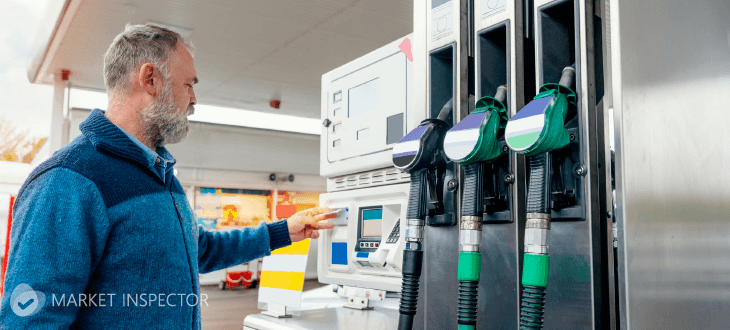
Telematics data from Teletrac Navman’s report highlights that switching to alternative fuel types and optimising driving routes via real-time GPS tracking can significantly reduce fuel consumption.
For instance, 37% of fleet operators reported fuel savings as a top benefit from telematics, reflecting an 88% increase from the previous year's survey. This optimisation leads to direct cost savings in fuel, which is often one of fleets' most significant variable expenses.
Regular vehicle service and maintenance
Telematics systems enhance vehicle maintenance by scheduling services based on vehicle usage rather than fixed time intervals. This proactive approach helps avoid costly repairs and reduces vehicle downtime.
For example, the Telematics Survey 2024 report indicates that fleet managers are using telematics to monitor and improve driver behaviours, such as harsh braking and excessive acceleration, which can lead to early wear and tear. By addressing these issues, fleets can extend the life cycle of their vehicles, ultimately saving on maintenance costs.
Lifecycle extension of fleet vehicles
By maintaining vehicles regularly and managing driving behaviours, telematics systems contribute to extending the operational life of fleet vehicles. This is achieved by preventing premature deterioration of vehicle parts reducing the frequency and cost of replacements.
Telematics' predictive maintenance capabilities also play a crucial role in this aspect, as they help fleet managers identify and resolve potential vehicle issues before they become severe.
These elements combined show that telematics and vehicle tracking systems provide critical operational data and translate this information into cost-saving measures. This dual benefit helps businesses manage their fleets more effectively while significantly reducing operational costs.
Improved customer service

In today's competitive business environment, the ability to provide enhanced customer service is not just a goal but a necessity.
According to Verizon Connect’s 2024 Fleet Management Software Buyer's Guide, fleet management software stands out as a crucial tool in achieving this by offering real-time updates and precise arrival times. This level of transparency is critical for customer satisfaction and boosts the reliability of services provided.
Real-time updates enhance customer trust
Real-time tracking enabled by fleet management software allows businesses to provide customers with accurate and timely updates about service status. This not only enhances customer trust but also enables businesses to manage expectations effectively.
Whether it’s a delivery service or field operations, customers appreciate being in the know, which significantly boosts their satisfaction and loyalty.
Precise arrival times improve service reliability
One of the significant benefits of using fleet management software is the ability to provide precise arrival times. This capability is particularly beneficial in logistics and delivery services, where time is often of the essence.
By knowing exactly when a truck or service technician will arrive, businesses can plan more efficiently and make the most of their resources, thereby increasing overall service reliability.
Competitive advantage in a demanding market
The current market demands high reliability and timeliness from service providers. Fleet management technology meets these demands and offers a competitive edge by improving operational efficiencies and reducing costs.
GPS tracking, route optimisation, and automated scheduling are just a few features that help streamline operations and ensure services are delivered more promptly and accurately than ever before.
Enhanced security

Vehicle tracking systems improve security by monitoring for unauthorised use or deviations from planned routes and facilitating the rapid recovery of stolen vehicles. They are integral in managing driver behaviour, ensuring compliance with safety standards, and reducing the risk of accidents, essential for maintaining a safe work environment.
Some key security features of GPS vehicle tracking systems are below.
- Monitoring driver behaviour: These systems can track how drivers handle vehicles, including speed, braking patterns, and adherence to traffic rules. By analysing driving habits, companies can identify risky behaviours and provide targeted training to improve safety.
- Anti-theft measures: GPS tracking helps rapidly recover stolen vehicles by providing precise location data. Some systems offer advanced features like geofencing, where alerts are generated if a vehicle moves outside a predefined area, indicating potential unauthorised use.
- Accident alerts and response: Fleet managers can receive immediate alerts during an accident, allowing for a swift response. This capability helps ensure driver safety and manage emergency services more efficiently.
According to the GPS Vehicle Tracking: A Start-Up Guide for Your Business white paper by Bobit Fleet Group, here are five main factors to consider when implementing a GPS tracking system:
- Business challenges and needs: Understand your fleet's specific challenges, such as high fuel costs or safety concerns, and ensure the tracking system addresses these issues.
- Cost implications: The pricing of GPS tracking solutions varies based on features and the scale of deployment. Assess which features are essential to determine the most cost-effective solution.
- Designating a point person: Assign a responsible individual to manage the GPS tracking system, ensuring that the data collected is used effectively to enhance fleet operations.
- Employee introduction: Transparently introduce GPS tracking to your employees, emphasising its benefits in improving safety rather than just monitoring their actions.
- Making an informed decision: Consider running pilots with potential systems to compare and choose the one that best fits your business needs.
Enhanced security through GPS vehicle tracking systems helps manage fleet operations more effectively and plays a crucial role in improving safety standards. By considering these considerations, businesses can leverage GPS tracking technology to mitigate risks, enhance operational efficiencies, and foster a safer working environment.
Sustainability
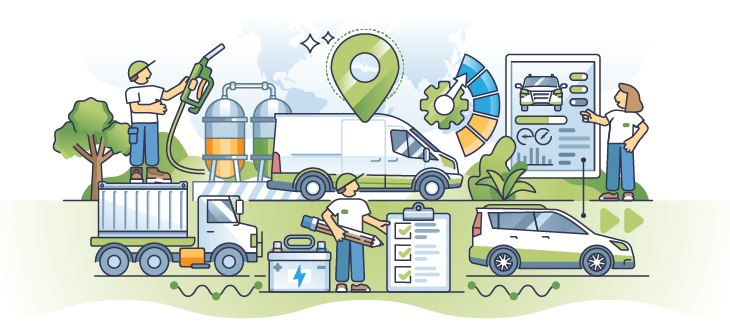
As businesses in 2024 increasingly prioritise sustainability to align with United Nations goals, vehicle tracking (VT) technologies play a crucial role. Here's how VT is shaping a sustainable future for fleet management, supported by data from the Telematics Survey 2024 (TS24):
-
Reduction in carbon emissions
Vehicle tracking systems optimise routes, thereby reducing unnecessary travel and idle times. According to TS24, operators who use VT technologies have seen a decrease in fuel usage, which directly contributes to lower carbon emissions. With 25% of fleets transitioning to alternative fuel types to mitigate rising fuel costs, VT is pivotal in effectively managing these new energy sources. -
Enhanced fleet efficiency
TS24 reveals that 37% of respondents highlighted fuel savings as a top benefit of using telematics - an 88% increase from the previous year. This efficiency reduces costs and the fleet's overall environmental footprint by minimising fuel consumption and associated emissions. -
Support for decarbonisation initiatives
With 56% of survey respondents sceptical about government mandates on sustainable energy transitions, VT provides a self-regulated path towards decarbonisation. The survey notes that many fleets are already operating or planning to introduce vehicles powered by alternative energies such as electric and hydrogen. -
Data-driven sustainability decisions
Telematics systems collect vast amounts of data that can be analysed to make informed decisions about vehicle maintenance, efficiency, and utilisation. TS24 indicates that nearly half of the fleets use AI integrated with VT to predict maintenance needs and optimise vehicle usage, reducing the environmental impact. -
Regulatory compliance and reporting
With the increasing complexity of environmental regulations, VT helps fleets comply with these standards by providing accurate, real-time data on emissions and fuel consumption. This capability is crucial as fleets navigate the changing regulatory landscape, helping them avoid penalties and contribute positively to environmental goals.
By leveraging VT, companies can improve their efficiency and significantly contribute to the broader environmental goals set by global communities. The TS24 underscores the importance of integrating advanced telematics solutions to meet the sustainability challenges of today and beyond.
What are the leading companies offering business vehicle tracking solutions in the UK?
Businesses looking to optimise their fleet operations have a variety of vehicle tracking companies to choose from, each offering specialised tracker types and tracking technologies tailored to meet diverse needs. Here, we introduce some of the leading providers known for their innovative solutions and specific areas of expertise in business vehicle tracking.
By leveraging advanced vehicle tracking systems for small businesses, organisations can enjoy enhanced fleet management, increased productivity, and significant cost savings. Solutions like Quartix tracking and Masternaut login are pivotal in managing fleets effectively. Whether it’s a tracker for a car, van tracking, or comprehensive fleet tracking systems, businesses are well-equipped to optimise their operations with affordable vehicle tracking and fleet management solutions for your business.
Teletrac Navman
Teletrac Navman is renowned for its comprehensive vehicle tracking solutions that integrate advanced telematics with detailed analytics to help businesses optimise their fleet operations.
They excel in providing insights into fuel management, driver behaviour, and compliance management, making them a top choice for fleets looking to enhance efficiency and reduce operating costs.
Masternaut
Masternaut stands out with its robust telematics solutions focusing on digital transformation and real-time vehicle tracking.
Masternaut's platform is known for providing deep insights into vehicle health, fuel efficiency, and driver behaviour, making it a powerful tool for improving operational efficiency and environmental sustainability. Their system seamlessly integrates with existing business processes, offering customised solutions that meet diverse fleet needs.
Customers typically use Masternaut's login page to access their vehicle tracking system, where they can monitor fleet activity, analyse performance data, and manage vehicle health and driver behaviour. This secure portal allows fleet managers to gain insights that assist in optimising operations and driving efficiency improvements across their fleets.
RAM Tracking
RAM Tracking specialises in GPS vehicle tracking systems that are exceptionally user-friendly and effective for managing fleets in real-time.
Their solutions are known for improving route planning and reducing fuel costs. They also offer strong support for theft recovery and asset management, which helps businesses safeguard their vehicles.
Quartix
Quartix is a well-regarded provider known for its easy-to-use, reliable vehicle tracking systems, particularly suited to small and medium-sized businesses.
Their systems excel in providing detailed driving style reports, helping companies reduce fuel usage and maintenance costs by promoting safer driving habits.
Verizon Connect
Verizon Connect offers robust vehicle tracking solutions that include various features like vehicle diagnostics, real-time tracking, and workforce management.
They are particularly valued for their scalable solutions, which cater to small fleets and large enterprises and offer extensive integration capabilities with other business systems.
Webfleet
Webfleet, previously known as TomTom Telematics, excels in providing highly accurate GPS tracking solutions combined with extensive data analytics.
They are particularly noted for their eco-driving indicators and easy integration with other business applications, aiding compliance and efficiency improvements.
These companies represent some of the best options available in the UK for businesses seeking to implement vehicle tracking systems to improve operational efficiencies, ensure compliance, and reduce costs. Each company offers distinct features and specialities, making them suitable for various business needs and fleet sizes.
Is commercial vehicle tracking legal?

In the UK, commercial vehicle tracking is legal, but it is governed by specific regulations to protect employees' privacy and rights. Here are the fundamental rules and regulations you should be aware of:
- Consent and notification: Employees must be informed about the tracking devices installed in their vehicles. Businesses must notify their drivers that their vehicles are being tracked and that the data is being collected. This is to maintain transparency and comply with privacy laws.
- Data Protection Act 2018 and UK GDPR: Vehicle tracking data is considered personal data under the UK GDPR. It mandates that data collected should be handled legally, fairly, and transparently. Businesses must ensure they have a legitimate basis for processing this data, typically under the grounds of legitimate interests, if tracking is essential for business operations. However, personal data should only be collected as necessary and protected against unauthorised access or loss.
- Employee privacy: Tracking should only occur during business hours unless the vehicle is used for work outside regular hours. Suppose a vehicle is used for both business and personal purposes. In that case, systems should either be turned off or set to a privacy mode during personal use to avoid monitoring outside of agreed tracking times. Some systems may provide a privacy button or similar functionality to enable this.
- Data handling and security: You must secure the tracking data against misuse or unauthorised access. This includes having robust security measures and ensuring that the data is only used for its intended purpose. Regular reviews and audits of the data collected and its use are also advisable to ensure compliance with the law.
- Rights of employees: Under the UK GDPR, employees have the right to access the data collected from tracking devices and, in some circumstances, request the deletion of their data. Employers must inform employees about these rights and provide a mechanism to exercise them.
Ensuring compliance with these regulations not only helps avoid legal penalties but also maintains trust and transparency within your organisation. It’s advisable to develop a clear vehicle tracking policy that outlines the use, management, and protection of tracking data and consult legal expertise to tailor this policy to your specific business needs.
Business vehicle tracking costs
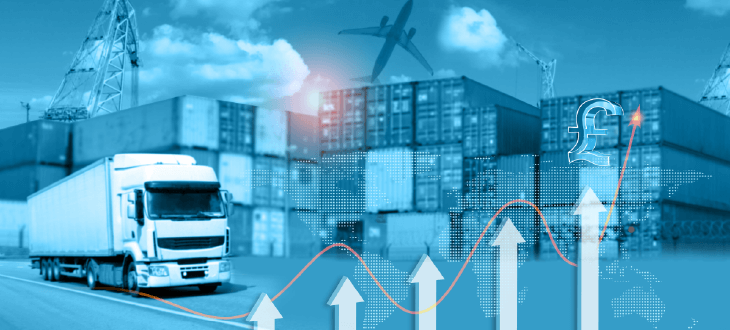
Investing in vehicle tracking systems involves initial costs for tracker fitting and installation, along with ongoing service fees. These systems are cost-effective in the long term due to significant reductions in operational expenses, such as fuel savings and decreased maintenance costs.
The costs for business vehicle tracking systems in the UK can vary widely based on the complexity of the system, contract length, and additional features required. Here's a breakdown of typical costs:
- Initial investment and setup costs: Basic GPS tracking systems typically cost between £ 150 and £300 per vehicle, including hardware and installation costs. More sophisticated systems with advanced features like real-time tracking and route optimisation can cost up to £500 or more per vehicle.
- Monthly subscription fees: Subscription fees for vehicle tracking services typically range from £10 to £30 per vehicle per month. The level of service (basic to premium) affects the price, with premium services offering more detailed analytics and comprehensive reporting tools.
- Additional costs: If professional installation is required, installation fees can vary between £50 and £100 per vehicle. Maintenance and occasional hardware updates or replacements could add £20 to £50 per vehicle annually. Additional features like fuel monitoring, temperature tracking, or integration with other systems can cost between £30 and £100 per vehicle.
Let’s look at the range of vehicle tracking prices from the companies we discussed earlier.
| Company | Initial cost per vehicle | Monthly fee | Additional features cost |
|---|---|---|---|
| Teletrac Navman | £200 - £350 | £15 - £30 | £30 - £100 |
| RAM Tracking | £150 - £300 | £10 - £25 | £20 - £50 |
| Quartix | £150 - £500 | £10 - £30 | £30 - £100 |
| Verizon Connect | £300 - £500 | £20 - £40 | £50 - £150 |
| Webfleet | £250 - £600 | £15 - £35 | £40 - £120 |
| Masternaut | £150 - £400 | £15 - £35 | £30 - £100 |
Insurance-approved vehicle tracker
Choosing insurance-approved vehicle trackers offers several benefits, particularly in reducing insurance premiums. Insurance companies recognise these trackers for their ability to significantly enhance vehicle security, making the insured vehicle less risky for theft or unauthorised use, according to Verizon Connect’s 2024 Fleet Technology Trends Report.
Benefits of insurance-approved vehicle trackers
Among the array of fleet management solutions, insurance-approved vehicle trackers emerge as a strategic tool. They offer multifaceted benefits that align closely with the current challenges faced by fleets. We have listed the benefits below.
- Lower insurance premiums: Insurance companies often offer substantial discounts on premiums for vehicles fitted with approved tracking devices. These discounts can vary, but reductions from 10% to 20% are common, depending on the insurer and the type of tracker installed. The reason behind these discounts is the reduced risk associated with vehicles, which are easier to recover in the event of theft due to tracking technology.
- Enhanced security: Insurance-approved trackers are designed to meet specific security standards that go beyond basic tracking, including features like tamper alerts, geofencing, and real-time tracking. This not only helps in recovering stolen vehicles more quickly but also deters theft in the first place.
- Enhanced risk management: These trackers provide real-time monitoring of fleet assets and offer insights into driver behaviour, such as speeding and harsh braking. By enabling proactive intervention to address risky behaviours, insurance-approved trackers help prevent accidents and minimise liability.
- Improved fleet efficiency: Insurance-approved trackers enhance fleet efficiency by monitoring vehicle usage, idle time, and unauthorised use. This data allows managers to optimise routes, better use assets, and allocate resources more effectively. Integration with fleet management systems streamlines administration, simplifies compliance reporting, and improves decision-making, reducing operational costs and maximising productivity.
- Financial justification: The initial cost of installing an insurance-approved tracker can be offset by the savings on insurance premiums over time. This makes it a financially viable option for many vehicle owners, especially those with high-value vehicles with a higher risk of theft. In the event of a claim, precise location data and historical driving records expedite claims processing and facilitate accurate liability assessment, mitigating financial losses.
- Compliance and peace of mind: For businesses, using insurance-approved trackers ensures compliance with insurance policies that may mandate such devices. It also gives fleet managers and vehicle owners peace of mind, knowing that their assets are protected to a higher standard.
By choosing trackers that are approved by insurers, vehicle owners and fleet operators enhance the security of their vehicles and leverage significant insurance cost savings. This dual benefit makes insurance-approved trackers an attractive option for reducing operational costs while boosting security measures.
Obtain multiple quotes to get the best deal on business vehicle tracking systems
Obtaining multiple quotes for business vehicle tracking systems is crucial for ensuring cost-effectiveness and operational efficiency. By comparing various providers, businesses can secure the best price for the features they need and gain insights into different solutions that could suit their specific requirements.
This competitive process helps find the most suitable offer and helps understand market standards, which is essential for negotiating favourable terms.
Seeking multiple quotes for business vehicle tracking systems can significantly benefit a company in several ways:
- Cost efficiency: A company can compare prices and select the most cost-effective option by gathering multiple quotes. This helps optimise the budget and potentially save a significant amount of money.
- Quality comparison: Different providers may offer varying features, reliability, and customer support levels. By obtaining multiple quotes, a company can assess each provider's services and choose the one that best fits their needs.
- Customisation options: Each provider may offer different options tailored to specific business requirements. Gathering multiple quotes allows a company to explore these options and select the system that best meets its operational needs.
Enhance your fleet management today. Fill out our quick form to receive free quotes from top vehicle tracking providers, compare prices and features easily, and select the best solution for your business needs.
The process is a quick 30-second form that delivers several free, no-obligation quotes, saving time and streamlining decision-making. Take advantage of this chance to improve your operational efficiency and security.
- Describe your needs
- Get free quotes
- Choose the best offer
It only takes 30 seconds

FAQ
Companies utilise vehicle tracking systems that incorporate GPS technology to monitor their fleet vehicles’ location, movement, and behaviour in real-time. These systems collect data that help optimise route planning, ensure compliance with regulatory requirements, and enhance operational efficiencies.
Vehicle tracking systems often include a combination of hardware installed in the vehicles and software that fleet managers use to monitor various metrics such as speed, route adherence, and idle times.
Yes, companies can track vehicles, but they must follow legal requirements to ensure compliance with privacy laws. In the UK, employers must inform their employees that their vehicles are being tracked.
The tracking must be justified by legitimate business needs and conducted in a manner that respects the employees’ privacy rights. Additionally, the collected data should be handled securely and only used for its intended purpose.
One of the top-rated vehicle tracking companies in the UK is RAM Tracking. This company is renowned for its comprehensive vehicle tracking solutions that offer detailed analytics on vehicle usage, driver behaviour, and operational efficiency.
These features are essential for businesses looking to enhance fleet management capabilities. RAM Tracking is celebrated for its reliable customer service and innovative technology catering to various industries.

Nicole Bea Kerr is a content writer for Market Inspector, leveraging her experience in B2B journalism and editing. She is interested in bringing more awareness to sustainability and helping businesses make informed choices through insightful narratives.
We strive to connect our customers with the right product and supplier. Would you like to be part of Market Inspector?

- Business Vehicle Tracking: Benefits, Laws, Solutions
- Why choose commercial vehicle tracking?
- What are the leading companies offering business vehicle tracking solutions in the UK?
- Is commercial vehicle tracking legal?
- Business vehicle tracking costs
- Obtain multiple quotes to get the best deal on business vehicle tracking systems
- FAQ
